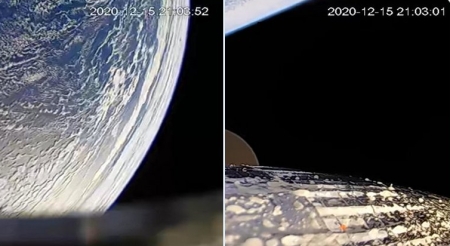United kicks family off plane because 2-year-old won’t wear mask
Insanity: United Airlines last week removed a family from a flight heading to New York because they were unable to get their 2-year-old child to wear a mask.
In a two-minute video posted on Dec. 11, since removed for no apparent reason by Instagram and Twitter, mother and Colorado resident Eliz Orban tearfully describes the experience then inserts footage of her masked husband attempting to put a surgical mask on the little girl while seated in the plane. The girl holds her hands up to her face, cries, and buries her head in his arm to avoid the mask.
As a flight attendant advises passengers over the comms to stow their baggage. A male flight attendant arrives at the aisle and demands the couple “grab their belongings and exit the aircraft,” saying he gave the couple “every opportunity” to get a mask on the child.
“We’re over here holding this mask over her face,” the father objects as he cradles the little girl. The video clearly shows him holding a neck gaiter over his daughter’s mouth and nose with a clasped hand. “You’ve got to be kidding me,” he says quietly.
The attendant states firmly that “if there’s non-compliance,” it is United’s policy to remove passengers from the flights. “This is compliance,” the father pleads, as the mother, holding the camera, reiterates their attempts to keep their toddler’s face covered.
You must watch the video to see how crazy and irrational this is. The father is holding her with a mask covering her face, even if it isn’t on her. More important, children don’t get COVID-19. Children don’t infect others. And the child is clearly not sick. To demand a mask on her makes no sense.
And yet, this is what airlines are demanding, even though the article also outlines further the technical reasons that make this policy pointless, including the documented claim by United that the passenger areas are already far more free of any aerosols that might carry the virus than any home or normal indoor space.
It is all empty panic and feel-good nonsense. While it can be argued that used properly in the right circumstances masks can have a limited benefit, this policy, which all the airlines seem to be following, is based on fear, idiocy, and irrationality. If anything, the misuse of masks in this situation (note in the video that the father has to hold the mask with his hands, which are a prime source of infection) might actually be increasing the spread of disease.
Insanity: United Airlines last week removed a family from a flight heading to New York because they were unable to get their 2-year-old child to wear a mask.
In a two-minute video posted on Dec. 11, since removed for no apparent reason by Instagram and Twitter, mother and Colorado resident Eliz Orban tearfully describes the experience then inserts footage of her masked husband attempting to put a surgical mask on the little girl while seated in the plane. The girl holds her hands up to her face, cries, and buries her head in his arm to avoid the mask.
As a flight attendant advises passengers over the comms to stow their baggage. A male flight attendant arrives at the aisle and demands the couple “grab their belongings and exit the aircraft,” saying he gave the couple “every opportunity” to get a mask on the child.
“We’re over here holding this mask over her face,” the father objects as he cradles the little girl. The video clearly shows him holding a neck gaiter over his daughter’s mouth and nose with a clasped hand. “You’ve got to be kidding me,” he says quietly.
The attendant states firmly that “if there’s non-compliance,” it is United’s policy to remove passengers from the flights. “This is compliance,” the father pleads, as the mother, holding the camera, reiterates their attempts to keep their toddler’s face covered.
You must watch the video to see how crazy and irrational this is. The father is holding her with a mask covering her face, even if it isn’t on her. More important, children don’t get COVID-19. Children don’t infect others. And the child is clearly not sick. To demand a mask on her makes no sense.
And yet, this is what airlines are demanding, even though the article also outlines further the technical reasons that make this policy pointless, including the documented claim by United that the passenger areas are already far more free of any aerosols that might carry the virus than any home or normal indoor space.
It is all empty panic and feel-good nonsense. While it can be argued that used properly in the right circumstances masks can have a limited benefit, this policy, which all the airlines seem to be following, is based on fear, idiocy, and irrationality. If anything, the misuse of masks in this situation (note in the video that the father has to hold the mask with his hands, which are a prime source of infection) might actually be increasing the spread of disease.





